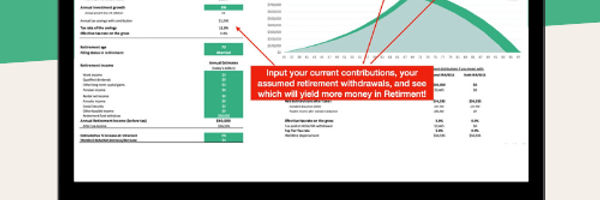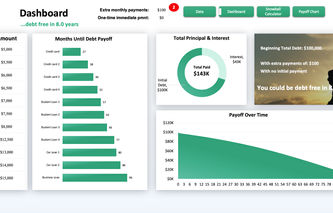If you've ever wondered, "Can I retire at 40 with 1 million dollars?" I'm here to spill the secret and say yes, you absolutely can. But, there are a few things you should know before jumping in. Here's how you can retire earlier, with one million dollars, and still live well!
Can you retire at 40 with a million dollars?
If you're reading this post, you're likely asking, "How much money do I need to retire at 40?" What about a million bucks? Can you retire at 40 with a million dollars? Yes, you can.
However, it's important to remember that the average lifespan in America is 77 years. That means you'd have at least 37 years in retirement, possibly more! Could your current lifestyle be fully funded with $1 million? The following information can help you decide and help you start preparing.
Similar articles:
How much does the average person retire with?
Surprisingly, the average person retires with just $255,200 in the bank. That is significantly less than the $1 million we're discussing.
However, that does not include pensions, social security, or passive income sources. It's also important to note that about 60% of Americans are worried about not having enough money during retirement. So asking if it's possible to retire on $1 million (or less!) is common.
At what age do most people retire?
In 2022, the average retirement age was 61 years old. That's 21 years longer than retiring at 40. But don't let that deter you! Many people reach financial freedom earlier and decide to retire before reaching the average retirement age.
How much money do I need to retire at 40?
Can you retire on a million dollars at 40? Maybe it's less, maybe it's more. So how much money do you need to retire at 40? This depends on your current lifestyle and how you plan on living after retirement. Experts recommend that by your retirement age, you need to have at least be 10-12 times your income saved.
In other words, if you make $50,000 a year, you need at least $500k to $600k to retire comfortably. So $1 million should be enough theoretically, but it's important to know your budget and how you'll make it stretch before reaching the "usual" retirement age of 65.

Roth IRA or 401k? This template will answer your questions.
With this template, you will get:
All DFY, simply add your details
Charts for comparison and clear answer
Easily update for any year (2023, 2024, 2025, etc…)

Can a person retire comfortably with 1 million dollars?
Yes, you can, but you'll need to adjust for future inflation and be careful not to overspend, especially when retiring early. Keep in mind that most early retirees don't get access to certain funds like social security or cheaper medical insurance.
Many of these benefits don't kick in until you're at least 65, so you'll need to stretch your million until that age (which by the way...is 25 years after a retirement age of 40). Will you be able to afford your current lifestyle, health insurance, and other expenses until those benefits kick in? If you're unsure, you may need to increase your retirement age or retirement savings (check our guide on the best savings accounts).
Can you live off the interest of $1 million dollars?
The historical S&P average annualized returns have been about 11.88%. So if you have $1,000,000 investing in the stock market, you will likely get an average of approximately $118,000 in interest every year. For many people, that's enough of a yearly income. But if you have bigger bills, debt, or live in a higher cost of living area, $118,000 may not stretch as far.
However, this does not include social security and passive income, like rental income or dividends. It also doesn't account for future inflation. But on average, $118k is a great yearly income.
Related:
How much is a typical Social Security check?
The typical social security check is around $2,993 if you retire at age 65. But there are a few caveats with social security checks. First, the average amount assumes that you've worked since the age of 22, and have earned a maximum income of $147,000 a year. And your benefit depends on how much you’ve earned and when you start taking out benefits.
You can claim your benefits early, at age 62, if you've contributed 10 years of work. But the full retirement age is 65. And if you wait until 70 to claim your benefits, you can earn even more.
Can you retire at 40 with 2 million dollars?
We basically already established that it's possible to retire at age 40 with 1 million dollars, so of course it's possible to retire at 40 with 2 million dollars! You'll just be able to do it more luxuriously.
Can I retire at 50 with 1 million dollars?
Can you retire at 50 with 1 million dollars? Yup! If you invest well and spend wisely, you can certainly retire by 50 years old with just $1 million. After all, you can do it at 40. Why not at 50?
Can I retire at 60 with 1 million dollars?
Maybe you're 60 years old and you're curious if you can quit work now that you've saved up $1 million... Can you retire at 60 with 1 million dollars? Absolutely.
At 60, you'll only need to cover the cost of your medical insurance for five years before Medicare kicks in. If you spend wisely and are consistently frugal for life, you can certainly retire at age 60!
Is early retirement a good idea?
Early retirement can be a good idea, but it depends on you! Retiring early has many benefits, including...
being able to travel more, especially while you're younger,
your mental and physical health benefits,
and an opportunity to start a new career or hobby that you wanted to do but couldn't do before.
But, retiring early can also have some cons, like...
it could be bad for your health (if you're not working towards new goals),
and you are taking the chance of running out of money faster.
If you can mitigate the cons and get more of the pros, early retirement can be a great thing.
Can you retire and still keep working?
Is it possible to retire but also keep on working? Absolutely! Retirement simply means that you don't HAVE to work anymore if you don't want to. But if you want to fill your days with volunteer work, consulting, freelancing, or even a part-time job that you thoroughly enjoy, that's okay too.
How To Retire on 1 Million Dollars
As you can see, there are many benefits to retiring early, but there are some potential drawbacks too. Here's some more info on how to retire on 1 million dollars at the age of 40.
Have A Budget
Dealing with your day-to-day finances is easier when you have a full-time job with a consistent income. But once you retire, it may be difficult to know your yearly income and expenses, especially when retiring early.
So you should make an "ideal" budget, one where you can live comfortably and not draw too much of your retirement funds down. A great way to do this is to speak with a financial advisor. They can look at the bigger picture and help you create a better plan for retirement and your budget.
Eliminate Debt
No one wants to make debt payments during retirement, especially high-interest payments to credit cards or personal installment loans. These payments can also take a major toll on your monthly budget, which means less money for fun during retirement.
The earlier you pay off your debt, no matter what it is, the better you can live during retirement. But of course, if you can't pay off everything before retirement, at least focus on high-interest debts that will take a large chunk of your income.

Roth IRA or 401k? This template will answer your questions.
With this template, you will get:
All DFY, simply add your details
Charts for comparison and clear answer
Easily update for any year (2023, 2024, 2025, etc…)

Related:
Have Passive Income
Earning passive income each month can help you stretch your million dollars further when retiring at 40. But what really is passive income?
A few examples are:
Earning money from investment properties
REITs
Earning dividends from stocks
A passive income business — like courses, ebooks, etc.
There are many other options for passive income, but these are just a few that can help you get started.
Think About Downsizing
Will you really need a three or four-bedroom home once you retire? Will you need to live in a large city like New York City or Chicago? Or, can you downsize your living situation and save on housing and living costs?
Not everyone will have a larger home or want to downsize, but it's something to consider when saving money, especially if you plan on living on less or traveling during retirement.
Don't Overpay Your Taxes
When you start withdrawing money from your 401(k) or other retirement accounts, you'll have to pay taxes on some of that. But it's possible to lower the tax hit and save on taxes, capital gains taxes, and premiums.
For example, the money you withdraw from a Roth 401(k) account is not taxable income. So many people follow aRoth IRA conversion ladder to save on their taxes. Of course, talking to a financial advisor is important to see what will work best for you and how you can save money on taxes each year.
Move To A Low-Tax State Or Country
Another way to lower your tax bill in retirement is to move to a place with lower (or no) tax rates.
The following states don’t charge income tax:
Florida
Tennessee
Texas
Wyoming
And these states don't have local or state sales taxes:
Delaware
Montana
New Hampshire
Oregon
Of course, you'll also want to look at property taxes or other taxes that you may pay during retirement, as those costs can also vary. If you want to retire overseas, these countries don't charge American expats tax based on a few factors:
The Bahamas
The British Virgin Islands
Maldives
Monaco
Panama
Portugal
Some countries charge a low tax rate for American expats, so those may be worth looking into as well. And as long as you withdraw your money smartly, you may be able to live tax-free during your entire retirement.
Plan For Healthcare Expenses
Even if you don't retire until 65, health care expenses can cost a small fortune. Between monthly premiums, deductibles, and coinsurance payments, you will be responsible for just about everything until Medicare kicks in. And even then, it's important to know what's covered and what's not.
So, how will you afford healthcare expenses before you qualify for Medicare, and will you need other insurance options like vision or dental?
Can you cut costs by being self-pay for certain checkups or procedures?
And, how much money will you need each month to keep up with these healthcare costs?
Knowing what your plan will be upfront can save you money in the long run and get you to 65 without severe health issues or problems.

Roth IRA or 401k? This template will answer your questions.
With this template, you will get:
All DFY, simply add your details
Charts for comparison and clear answer
Easily update for any year (2023, 2024, 2025, etc…)

Can I Retire At 40 With $1 Million Dollars? Yes!
Can you retire with 1 million dollars at age 40? Yes, it's totally possible to retire at 40 with a million dollars and have it last you until you leave this earth. With some planning and a little diligence, you could be well on your way to financial freedom and early retirement!



.jpg)
.jpg)
.jpg)




